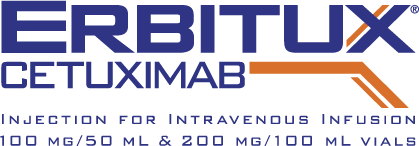WARNING: ALLERGIC REACTIONS AND HEART ATTACK
ERBITUX can cause serious and sometimes fatal allergic reactions. Serious allergic reactions due to ERBITUX therapy occurred in 2.2% of patients receiving ERBITUX during clinical studies; 1 patient died. The risk of anaphylactic reactions may be increased in patients with a history of tick bites, red meat allergy, or in the presence of certain antibodies which can react to ERBITUX.
Symptoms can include trouble with breathing (including tightening of the airways, wheezing, or hoarseness), low blood pressure, shock, loss of consciousness, and/or heart attack. Report these signs and symptoms of infusion reactions, as well as fever, and/or chills to your doctor or nurse.
Approximately 90% of the severe allergic reactions occurred with the first treatment with ERBITUX (even if the patient had been premedicated with antihistamines), although some patients experienced their first severe allergic reaction during a later treatment
Your doctor or nurse should watch you closely for these symptoms during treatment and for at least 1 hour following treatment and may need to stop therapy in the event of an allergic reaction. After the allergic reaction resolves, your doctor may be able to restart therapy.
If you have a severe allergic reaction, treatment with ERBITUX must be stopped immediately and not started again
ERBITUX can cause heart attack or sudden death.
Heart attack or sudden death occurred in 2% of 208 patients with head and neck cancer treated with radiation therapy and ERBITUX in a clinical study. Three patients with a prior history of coronary artery disease died within six weeks after receiving the last dose of ERBITUX. One patient with no prior history of coronary artery disease died one day after the last dose of ERBITUX.
Heart problems resulting in death or sudden death occurred in 3% of 219 patients with head and neck cancer treated with ERBITUX and platinum-based chemotherapy with fluorouracil in a clinical study.
Notify your doctor if you have a history of any heart disease
ERBITUX can cause lung disease. Lung disease occurred in less than 0.5% of 1570 patients receiving ERBITUX in clinical trials for colorectal cancer and head and neck cancer; 1 patient died.
Notify your doctor if you develop shortness of breath, a new or worsening cough and/or chest pain while receiving ERBITUX
ERBITUX treatment should be stopped if breathing symptoms worsen, and should not be restarted if lung disease is diagnosed
ERBITUX can cause skin problems including an acne-like rash, skin drying and cracking, infections (including infections of the blood, skin, eyes, and lips), swelling of the base of the nails or loss of the nails, inflammation of the eye or eyelid, decreased vision and abnormal hair growth. These symptoms were seen in several clinical trials for colorectal cancer and head and neck cancer with ERBITUX.
Sun exposure may worsen these effects. Patients taking ERBITUX should wear sunscreen and hats to limit sun exposure during treatment and for 2 months after the last dose of ERBITUX
Severe reactions with symptoms of rash; blistering of the skin, mouth, eyes, and genitals; and shedding of the skin have been seen in patients treated with ERBITUX. These reactions may be life-threatening and possibly lead to death. It is not clear if these reactions are related to the way ERBITUX works or to an immune response, such as Stevens-Johnson syndrome or toxic epidermal necrolysis. Your doctor may withhold, reduce dose or discontinue ERBITUX based on the severity of these symptoms.
Notify your doctor if you develop any of these symptoms while receiving ERBITUX
Risks when using ERBITUX with radiation and cisplatin. In a study of 940 patients with head and neck cancer, patients received either a combination of radiation and cisplatin (a cancer drug), or ERBITUX in combination with radiation and cisplatin. Adding ERBITUX resulted in an increase in occurrence of severe or life-threatening redness and sores of the lining of the mouth, lips or throat and other digestive organs; skin reactions caused by certain cancer drugs given after radiation; acne-like rash; heart problems; and blood electrolyte disturbances (compared to radiation and cisplatin alone)
Side effects resulting in death occurred in 4% of patients in the ERBITUX plus radiation and cisplatin treatment arm, and 3% in the radiation therapy and cisplatin alone treatment arm
2% of patients in the ERBITUX plus radiation and cisplatin treatment arm experienced decreased blood flow to the heart, compared to 0.9% in the radiation therapy and cisplatin alone treatment arm
The main point of the study was to measure how long patients survived before their cancer got worse. Adding ERBITUX to radiation and cisplatin did not improve this measure
ERBITUX when given by itself and in combination with other cancer drugs can cause low levels of magnesium, calcium and potassium.
If you have colorectal cancer with mutations in the Ras genes, you should not be treated with ERBITUX because you will not benefit from ERBITUX treatment and will experience side effects.
ERBITUX can harm your unborn baby. If you are able to become pregnant, you should use effective contraception during treatment with ERBITUX and for 2 months after the last dose of ERBITUX
What should I tell my healthcare provider doctor before taking ERBITUX?
Before you start treatment with ERBITUX, tell your doctor:
If you have any history of heart disease or a heart condition.
If you have a history of breathing problems or other lung problems.
If you are pregnant or if you plan on becoming pregnant. Because ERBITUX can harm an unborn baby, you should use contraception and not become pregnant during treatment with ERBITUX and for at least 2 months after your last dose of ERBITUX. If you become pregnant during your treatment or within 2 months after your last dose, discuss this with your doctor.
If you are breastfeeding or plan to breastfeed. ERBITUX may be passed through human breast milk. Because of the potential for serious side effects in nursing infants from ERBITUX, you should not breastfeed during ERBITUX therapy and for 2 months after the last dose of ERBITUX.
Tell your doctor about all the medications you are taking, including prescription and over-the-counter medications.
What are the possible side effects of ERBITUX?
The most common side effects (all grades of severity) reported in patients with head and neck cancer treated with ERBITUX in combination with radiation therapy versus radiation therapy alone (incidence ≥25%) were: feeling weak, fever, nausea, vomiting, weight loss, dehydration, elevated liver enzymes in blood tests, sore throat, acne-like rash, and skin irritation in the radiation area. In areas treated with radiation therapy, the addition of ERBITUX to the radiation therapy increases the risk of damage to surrounding healthy tissues in the area treated with radiation. The most common serious side effects (incidence ≥10%) reported by patients included skin irritation in the radiation area, acne-like rash, and weight loss.
The most common side effects (all grades of severity) in patients with head and neck cancer treated with the European version of ERBITUX in combination with platinum-based chemotherapy with fluorouracil versus chemotherapy alone (incidence ≥25%) were: acne-like rash, nausea, infection, rash, diarrhea and anorexia, a psychological disorder characterized by a loss of appetite. Most common serious side effect (incidence ≥10%) reported by patients in either arm was: infection. ERBITUX results in approximately 22% higher blood levels of cetuximab as compared to the European version of ERBITUX. It is possible that U.S. patients receiving ERBITUX may experience more frequent or severe side effects than patients in the study conducted in Europe.
The most common side effects (all grades of severity) in patients with Epidermal Growth Factor Receptor (EGFR) positive, KRAS wild-type colorectal cancer that has spread to other parts of the body who were treated with the European version of ERBITUX in combination with FOLFIRI (irinotecan, fluorouracil, leucovorin) versus FOLFIRI alone (incidence ≥25%) were: abnormal decrease in certain white blood cell counts, diarrhea, sore mouth, fever, anorexia, a psychological disorder characterized by a loss of appetite and rash which includes a rash including acne-like rash. Most common serious side effects (incidence ≥10%) reported by patients in either arm were: abnormal decrease in certain white blood cell counts, acne-like rash, and diarrhea. In this study, the type and severity of side effects seen with European cetuximab were similar to other studies of U.S. patients receiving ERBITUX for metastatic colorectal cancer.
The most common side effects (all grades of severity) in patients with Epidermal Growth Factor Receptor (EGFR) positive, KRAS wild-type colorectal cancer that has spread to other parts of the body who were treated with ERBITUX and supportive care versus supportive care alone (incidence ≥25%) were: rash including shedding of the outer layer of the skin, dry skin, itchy skin, other skin problems, nail changes, feeling tired, fever, other pain, headache, shortness of breath, cough, nausea, constipation, diarrhea, vomiting, sore mouth, infection without decrease in certain white blood cell counts, sensory neuropathy (weakness, numbness and pain from nerve damage usually in the hands and feet) and problems sleeping. Most common serious side effects (incidence ≥10%) reported by patients included: feeling tired, other pain, rash including shedding of the outer layer of the skin, shortness of breath, other intestinal problems and infection without abnormal decrease in certain white blood cell counts.
The most common side effects (all grades of severity) in patients with colorectal cancer that has spread to other parts of the body whose tumors had a protein called Epidermal Growth Factor Receptor (EGFR) treated with ERBITUX and irinotecan were: acne-like rash, feeling weakness or discomfort, diarrhea, and nausea. The most common serious side effects reported included: diarrhea, decrease in white blood cell count, feeling weakness or discomfort, and acne-like rash.
The most common side effects (all grades of severity) in patients with BRAF V600E mutation-positive colorectal cancer that has spread to other parts of the body who were treated with ERBITUX and encorafenib versus ERBITUX with irinotecan or ERBITUX with FOLFIRI (incidence ≥25%) were: fatigue, nausea, diarrhea, acne-like rash, abdominal pain, decreased appetite, joint pain, and rash.
You are encouraged to report negative side effects of prescription drugs to the FDA. Visit www.fda.gov/medwatch or call 1-800-FDA-1088.
ERBITUX is available by prescription only.
CE CON ISI_ALL 14SEP2022
Please see full Prescribing Information for ERBITUX, including Boxed Warnings for allergic reactions and heart attack.

